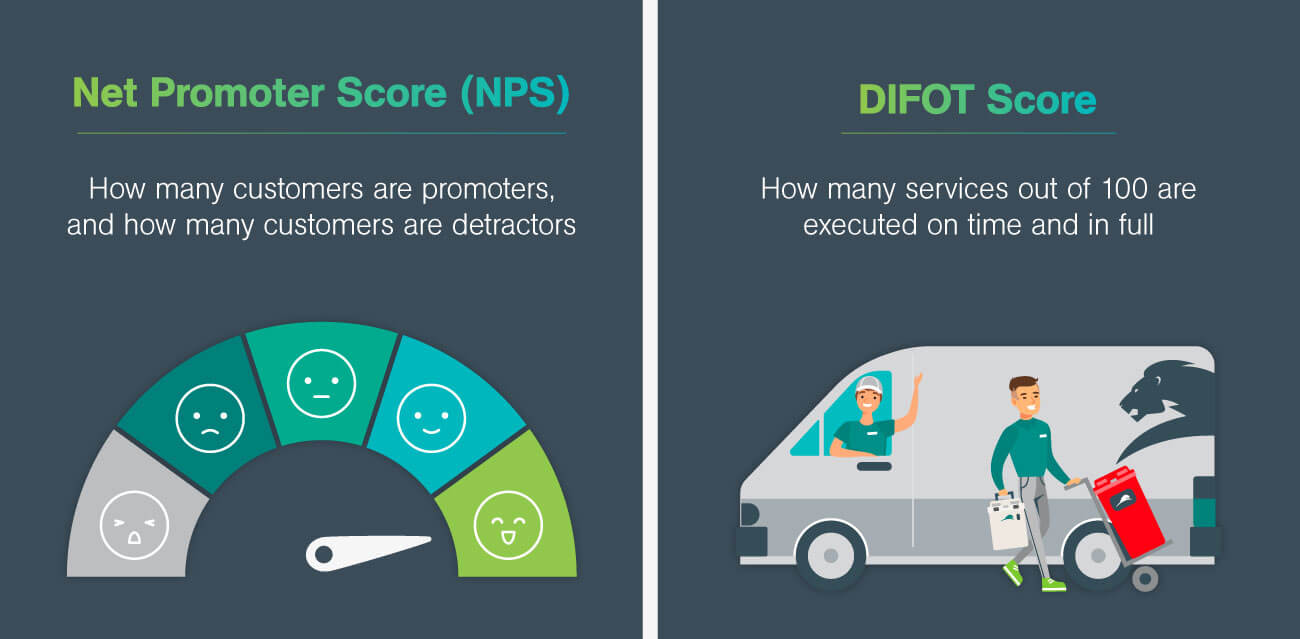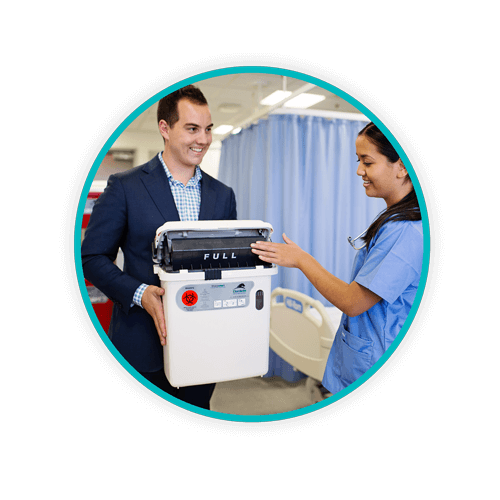10 Things to Consider When Evaluating Your Medical Waste RFP

Is your healthcare facility considering changing medical waste service providers? Whether you are in the early stages of scoping new clinical waste vendors or currently evaluating your RFP submissions, it’s important to ensure clarity on your organization’s goals and the standards of service and partnership you are looking for. Just as no two healthcare facility’s needs are the same, every medical waste service provider offers different products and services. At the end of the day, finding a right-fit partner that can grow with you is the priority. Here are some variables to consider when evaluating your Medical Waste RFP.
10 THINGS TO CONSIDER WHEN EVALUATING YOUR RFP
1 / Standardized range of reusable containers for all healthcare waste streams
4 / Transparent Reporting, Data, KPIs, and Quarterly Business Reviews
6 / Customer Service + Quality Assurance
7 / Integrated Training + Education
8 / Sustainability, Reusability, and Net Zero Goals
10 / References + Testimonials
1. Standardized range of reusable containers for all healthcare waste streams
Standardization of products is one of the most practical ways to bring simplicity to a busy healthcare facility. In a busy environment, creating a standardized system for clinicians to use directly impacts waste segregation, storage, safety, sustainability, and costs of over-categorized medical waste.
- Segregation: Each healthcare waste stream has its own unique regulatory requirements for compliant segregation, mandated at a local, state, and federal level. For example, waste streams such as hazardous waste, pharmaceutical waste and chemotherapy waste pose the greatest regulatory and safety risk and require special handling, treatment processes, and proof of destruction. They also, consequently, have a higher cost associated with treatment and disposal. Being able to identify and define the difference between waste streams is key in the process of segregation, collection and transportation, as well as disposal. With a variety of products in the mix, it’s easy for clinicians to become confused and improperly dispose of high-risk waste. You’ll know you’re dealing with a right-fit medical waste partner if each container is clearly differentiated by color and labelling.
- Storage: Standardized medical waste containers are easy to use and can be easily stored in a variety of locations, including examination rooms, laboratories, and patient care areas. This makes it convenient for facilities to safely store and dispose of medical waste.
-
Safety: Standardized medical waste containers are designed with safety in mind. They have tight-fitting lids to prevent the contents from spilling, and they are made of durable materials that can withstand punctures and leaks. This helps to prevent accidental exposure to hazardous materials and reduces the risk of injury or illness.
Shameless Plug: Daniels is the only company to offer a unified, fully reusable, and clinically engineered range of containers for all non-hazardous healthcare waste streams. The interchangeability of all Daniels containers and accessories, and the ownership of our experts working across all waste streams, will not only enhance safety and movement efficiencies, unify waste segregation education, and optimize storage and movement, but will also delivers clinical results.
2. Cost vs. Value
When comparing pricing between two vendors, it’s important to consider the total value of services being provided, beyond container and disposal costs. Larger facilities with robust operational intricacies require a targeted approach to clinical waste management that takes into consideration EVS schedules, variances in department-level volumes, patient interruption risks, safety requirements, infection control standards, and more.
Shameless Plug: Daniels applies a Four Walls approach to medical waste management that ensures custom-fit solutions for your facility that optimize your total cost of ownership. Through targeted training, container placement, process improvement and Daniels' proprietary barcode scanning system, TRACE, we are able to enhance efficiencies and drive substantial cost benefits to our partners. Our one-of-a-kind innovative solutions such as the Chemosmart and Medismart set new standards in infection control, environmental effectiveness, logistical cost savings and compliance within the industry. These innovations have been implemented with many of our key strategic partners. As an example, by implementing the Medismart solution, one of our customers reduced medical waste disposal costs by 31%, realized a 69% reduction in labor costs, and had a 65% decrease in medical waste volume. At Daniels we partner collaboratively to provide innovative program solutions that align with your priorities and initiatives.
If you’re looking for more than someone to simply dispose of your medical waste, it’s important to keep an open mind when evaluating your medical waste RFP.
3. Account Management
Account management is not something to be taken lightly. Many vendors promise a dedicated account manager, only to find themselves leaving endless voicemails to a 1-800 toll-free black hole. A dedicated account manager should be regularly onsite to meet with your clinical teams, provide targeted in-person training, and be committed to timely issue-resolution. With multiple waste streams of various compliance-risk and disposal costs, it’s important to find a partner that is all-in on providing dedicated, consistent support to your facility.
Shameless Plug: Daniels’ approach to account management is collaborative and consistent. Our Account Managers are regularly onsite to engage with key leaders on a regular (monthly) basis and conduct Quarterly Business Reviews to ensure program goals are being met. Through this quarterly process, Daniels account managers recommend areas for improvement, efficiency gains, and cost reduction strategies. From there, our team follow-up with organizational education for clinical and facility staff to support initiatives.
At the end of the day, you should feel a sense of trust and support between you and your account management team.
4. Transparent Reporting, Data, KPIs, and Quarterly Business Reviews
 Clinical waste streams vary in compliance considerations and disposal costs. For example, it is far more expensive to dispose of trace chemotherapy waste than for a used coffee cup. For this reason, it is critical that your chosen vendor is able to provide customized reporting that differentiates sharps waste, RMW waste, Chemo waste, etc. Otherwise, healthcare facilities will have no way to track waste volumes and costs. Chances are, if you don’t know what you’re paying for, you are being over-charged.
Clinical waste streams vary in compliance considerations and disposal costs. For example, it is far more expensive to dispose of trace chemotherapy waste than for a used coffee cup. For this reason, it is critical that your chosen vendor is able to provide customized reporting that differentiates sharps waste, RMW waste, Chemo waste, etc. Otherwise, healthcare facilities will have no way to track waste volumes and costs. Chances are, if you don’t know what you’re paying for, you are being over-charged.
Shameless Plug: We truly believe that the standardization of a waste planning process, the development and close monitoring of Key Performance Indicators (KPIs), and the uptake of a core product offering (Sharpsmart and other reusable safety containment options) can deliver substantial efficiencies and cost savings across every healthcare system. One of the key drivers to reducing overall spend is the partnership that our experienced staff bring to aligning clinical outcomes against daily waste management processes. Our account management teams provide department-level reporting using the following metrics:
- Waste volumes by type
- Average weight against best practice (Practice Green Health)
- Service frequencies and suggested adjustment
- Container utilization & container turns
- Opportunities to upsize and reduce frequencies
- New product offerings
-
Waste segregation audits
5. NPS + DIFOT Scores
When evaluating any service provider, it is critical to know the supplier’s service scores. Net Promoter Score (NPS) and Delivery in Full On Time (DIFOT) are the simplest way to understand whether your vendor prioritizes and deliver on customer excellence.

NPS: Net Promoter Scores are a widely used market research metric, calculated through a quarterly survey sent out to customers asking how likely respondents are to recommend a company, product, or a service to a friend or colleague. Based on a score of -100 – 100, NPS metrics will tell you everything you need to know about a service provider. The medical waste industry has an average NPS score of 15, which is considered a low bar in the realm of high-quality service. (FedEx’s NPS score is currently rated at 25).
Daniels Health is proud to boast an NPS score of 53 (a minimum 35 points above industry average and even ahead of top performing brands in other industries such as Apple, which sits at 47)
DIFOT: DIFOT is a key performance indicator that examines product/service delivery from the customer’s point of view. At Daniels, we measure a successful delivery as a service that is not only on time, but has the right amount and type of containers (unless otherwise pre-agreed with the customer) and no complaint has been made, i.e., 100% of the service is as expected. Currently, our national DIFOT score is 98.85%, meaning out of every 100 services, we achieve 98 deliveries on time and with complete delivery of products.
If your medical waste vendors scores fall below these metrics, the likelihood of your healthcare system being negatively impacted by poor service increases.
6. Customer Service + Quality Assurance
When evaluating your medical waste RFP, be sure to ask selected vendors about their customer service standards, issue escalation process, and quality assurance program. As the customer, it’s important to understand what sort of safeholds and contingencies are in place to ensure any service issues can be resolved in a timely matter.
- What is the issue resolution timeline?
- How are issues tracked internally?
- What is the escalation process? Does it end at regional management, or is senior leadership involved in outstanding issue resolution?
- How does the vendor communicate key updates in resolving issues?
- What happens if an issue is not resolved in a reasonable timeframe?
- What happens if my driver misses my pickup?
-
What sort of contingency stock is available?
Shameless plug: Daniels business units operate as a fully functional division responsible for service excellence, quality, customer satisfaction and KPI results. Our Field Service Manager, Operations Manager and Account Managers connect every week to work through any changes or challenges within the state, and our “no-silo” approach ensures that the team owns every customer solution and is accountable to results. Across every department and function, we together carry the responsibility of our customers’ satisfaction and success. All issues are tracked in our CRM and escalated to senior leadership if not resolved within a 48-hour timeframe.
In a busy hospital environment, quick issue resolution is paramount to ensuring your internal operations are running smoothly. If you don’t have clean containers, or if you have waste piling up at your back dock, it’s likely your vendor is struggling to meet basic service standards. Make sure your new vendor is adept to resolving issues expediently, and with care.
7. Integrated Training + Education
 Whether you are a small local hospital or a large healthcare system, you understand the complexities of adhering to local and federal regulations. In a busy clinical environment, the opportunities to improperly segregate medical waste are plentiful. Ask your potential medical waste vendors what sort of educational-support they are able to provide. “One-size fits all” segregation posters are ineffective and do not take into consideration the unique variables of your facility.
Whether you are a small local hospital or a large healthcare system, you understand the complexities of adhering to local and federal regulations. In a busy clinical environment, the opportunities to improperly segregate medical waste are plentiful. Ask your potential medical waste vendors what sort of educational-support they are able to provide. “One-size fits all” segregation posters are ineffective and do not take into consideration the unique variables of your facility.
Shameless plug: Daniels employs in-house compliance and education experts dedicated to keeping up to date with changing regulations that may impact your facility. To deliver environmental and cost outcomes, we place a high level of importance on training and facility-wide education of waste segregation, safety, and management of regulated waste streams. Our dedicated Account Managers and Field Service Managers provide regular and ad-hoc in-servicing of both operational and clinical staff to ensure a high level of understanding and comfort with both the containers and the workflow. We offer a robust collection of regulatory educational materials to provide state and federal guidance for all our partners. Our Daniels team have become experts on regulatory compliance through the experience of managing large health systems, non-acute customers, and alternative waste generators.
8. Sustainability, Reusability, and Net Zero Goals
Healthcare facilities across the country are re-evaluating their environmental footprint amidst the climate crisis. Whether or not you have crossed that bridge, there is a high likelihood that this will become a priority for all medical facilities in the near future. One of the most practical ways to reduce your carbon emissions is to reduce waste volumes and replace single-use plastics with reusable products.
Does your vendor offer a reusable suite of clinical containers for all waste streams? Has the vendor made Net-Zero commitments to reduce carbon emissions? Do they employ sustainability experts, and are they available at no additional cost to assist your facility?

Shameless Plug: Daniels Health is committed to leading the industry in innovation and practices that minimize ecological impact. In 2022, we officially joined the U.S. Department of Health & Human Services’ (HHS) Pledge to decarbonize the healthcare sector in pursuit of achieving net-zero emissions. As a signer of this pledge, we are formally committed to reducing emissions by 50% by 2030 with the goal of reaching net-zero emissions by 2050.
Through superior technology, reusable products and recycling initiatives, our solutions minimize landfill, manufacturing excess, and CO2 emissions. By using the Daniels Sharpsmart system, your environmental impact will be significantly reduced each year. Our strategies to achieve this are:
1) Create a product range that minimizes the environmental impact of both production and distribution
2) Minimize environmental burden by evaluating operations and ensuring they function as efficiently as possible
3) Minimize toxic emissions through the selection and use of our fleet and the source of its power requirement
4) Actively promote recycling both internally and with our customers and suppliers
5) Meet or exceed all the environmental legislation that relates to the company.
9. Subject Matter Experts
In a service-based industry with many regulatory considerations, subject matter experts are integral to ensuring you are compliantly segregating and disposing of medical waste. It’s important that your chosen vendor employs in-house expertise that is available to support on key initializes and regulatory changes impacting your facility. Ensuring compliant cradle-to-grave management will help you to avoid costly compliance fees and citations.
Daniels Health places a high importance on providing compliance support to our customers. At a national level, we employ subject matter experts to handle all of our regulatory, permitting, labelling, transport, waste handling, waste treatment, supply chain and operational requirements, all of whom support our business units to drive best-practice, while also being a called-on resource for specific customer challenges.
Whether you are looking for guidance on pharmaceutical waste segregation or waste reduction initiatives, our subject matter experts are ready to support your organization’s needs.
10. References + Testimonials
One of the easiest ways to determine whether a medical waste vendor is a right-fit partner is to request references and testimonials. When possible, we suggest coordinating a call with chosen reference accounts for clients under a vendor’s purview. Pro-Tip: ask for references from the vendor’s former customers. If a contract ended poorly, you’ll want to know about what led up to this. Be sure to ask questions that feel important to your specific needs, examples include:
- What is their customer service / support like?
- How was the implementation managed?
- What sort of account management support do they receive?
- What biggest impact did the vendor have on their facility?
- How are issues resolved?
- How did they communicate compliance updates?
-
Would you recommend the vendor, overall?
Changing medical waste service providers is no small feat! The transition can be a complicated undertaking, so it’s important that whoever you choose as your next partner is dedicated not only to supporting you from the beginning of the contract, but throughout the lifetime of your partnership.
